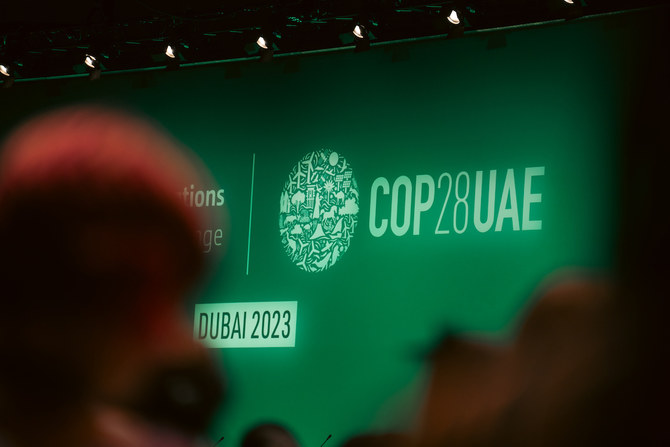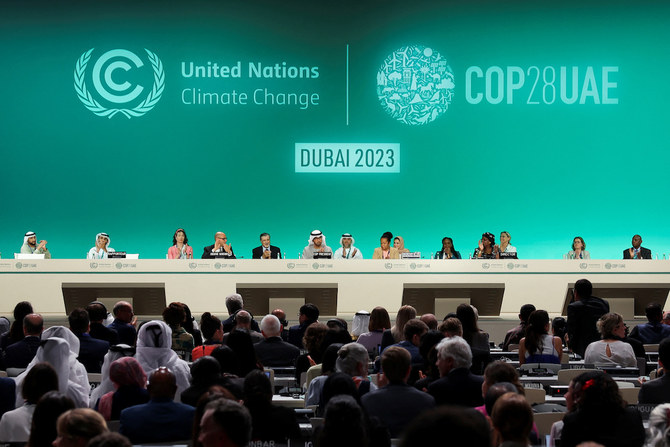DUBAI: Up to 200 global leaders will join over 80,000 delegates gathered in Dubai for the UN climate conference as governments prepare for negotiations on whether to agree, for the first time, to phase out fossil fuels – the main source of global warming.
With finance also high on the meeting agenda, the COP28 presidency has published a proposal on the eve of the summit for countries to formally adopt the outlines of a new UN fund to cover losses and damages in poor countries being hit by climate disasters like extreme flooding or persistent drought.
—–
COP28 formally approves climate disaster fund arrangements
DUBAI: Countries at the UN COP28 climate summit on Thursday formally approved a deal on a new climate disaster fund.
The deal was adopted following the COP28 opening ceremony, drawing a standing ovation from delegates.
Representatives from developed and developing countries painstakingly crafted the agreement during negotiations this year. It will launch a fund to help vulnerable nations cope with the cost of climate-driven damage from drought, floods and rising seas.
UN weather agency says 2023 is the hottest year on record, warns of further climate extremes ahead
DUBAI: The UN weather agency said Thursday that 2023 is all but certain to be the hottest year on record, and warning of worrying trends that suggest increasing floods, wildfires, glacier melt, and heat waves in the future.
The World Meteorological Organization also warned that the average temperature for the year is up some 1.4°C from pre-industrial times – a mere one-tenth of a degree under a target limit for the end of the century as laid out by the Paris climate accord in 2015.
The WMO secretary-general said the onset earlier this year of El Niño, the weather phenomenon marked by heating in the Pacific Ocean, could tip the average temperature next year over the 1.5°C target cap set in Paris.
WATCH: Opening ceremony of COP28: UN Climate Change conference
1101 GMT
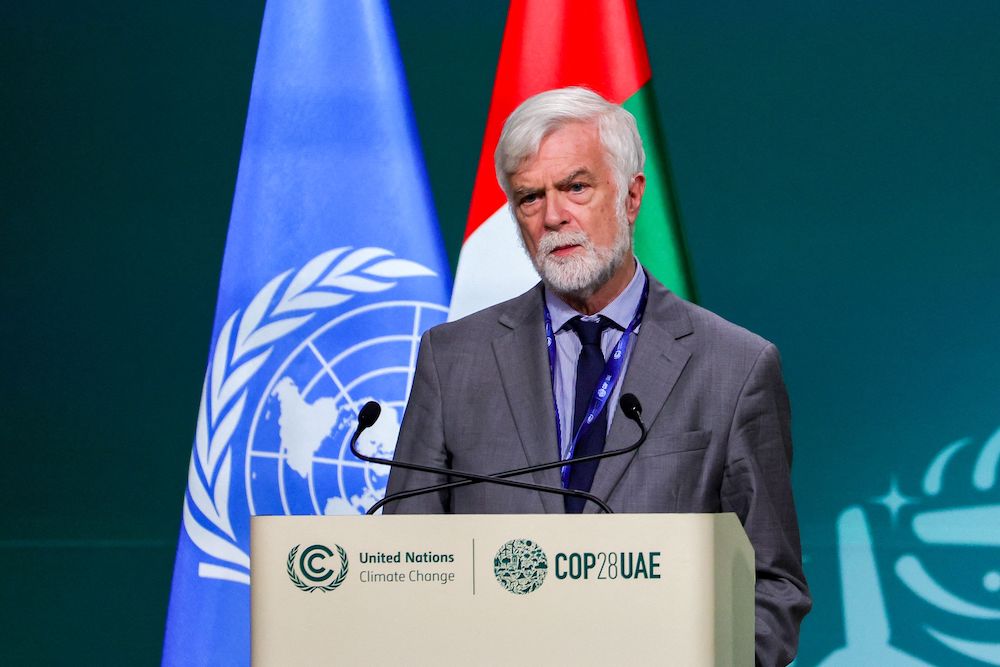
“Human activity has led to changes in climate at a magnitude that is unprecedented over centuries and thousands of years,” according to Jim Skea, chairman of the Intergovernmental Panel on Climate Change.
“If we do not find immediate and deep emission reductions across all sectors, we will not meet the goals of the Paris agreement,” he said.
“Our assessments have identified multiple options to reduce greenhouse gas emissions and adapt to climate change, and these can be implemented right now. But they need to be scaled up and mainstreamed through policies and increased financing.”
“As the chair of the IPCC, the scientific community is poised for using the resources available to support the outcomes of COP28, in shaping climate actions based on science. But finally, let us recall, science by itself is no substitute for action,” Skea said.
1051 GMT
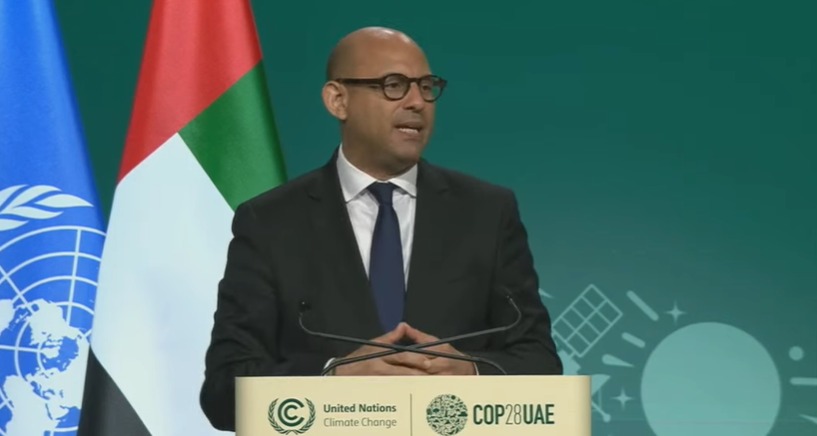
“Today, we find ourselves in a rather different position, in humanity’s climate action journey. We are taking baby steps. Stepping far too slowly from an unstable world that lacks resilience, to working out the best responses to the complex impacts we are facing,” Simon Stiell, executive secretary of UNFCCC, said in his remarks at the opening of COP28.
“We must teach climate action to run. Because this has been the hottest year ever for humanity. So many terrifying records were broken. We are paying with people’s lives and livelihoods,” he said.
“If we do not signal the terminal decline of the fossil fuel era as we know it, we welcome our own terminal decline. And we choose to pay with people’s lives. If this transition isn’t just, we won’t transition at all. That means justice within and between countries. Sharing benefits across society. Ensuring that everyone – women, indigenous peoples and youth, in all their diversity – have equal opportunities to benefit from these transitions.”
“In 2024, countries will submit their first Biennial Transparency Report. This will mean the reality of individual progress can’t be concealed… And let this be your first official notice that early in 2025, countries must deliver new Nationally Determined Contributions. Please start working on them now,” Stiell said.
“Science tells us we have around six years before we exhaust the planet’s ability to cope with our emissions. Before we blow through the 1.5°C limit,” the executive secretary of UNFCCC said.
“This is the biggest COP yet – but attending a COP does not tick the climate box for the year. The badges around your necks make you responsible for delivering climate action here and at home… turn the badge around your necks into a badge of honor, and a life belt for the millions of people you are working for. Accelerate climate action. Teach it to run,” added.
1022 GMT

In his opening speech, COP28 President designate Sultan Al-Jaber urged delegates as well as oil companies to work together at the UN climate summit. He said, “we must ensure that this COP delivers the most ambitious global stocktake possible.”
He stressed that the COP28 is committed to unlocking finance to ensure that the global south does not have to choose between development and climate action.
While Al-Jaber hailed the initiative of national oil companies to step up, he said “it is not enough.” “They can do more. Every nation, every sector and every one of us has an urgent role to play.”
“We can bring mitigation, adaptation and means of implementation which includes finance under one umbrella,” according to Al-Jaber, who also runs state-run Abu Dhabi National Oil Company.
“I ask you to start this COP with a new mindset, adopt different thinking, be flexible. Ensure the most ambitious global stocktake. I want this COP to be the COP that maximizes mitigation on momentum,” Al-Jaber said.
He stressed that the ‘role of fossil fuels’ must be part of climate deal. “It is essential that no issue is left off the table,” according to the UAE official. He added that “let this be the COP where we deliver our promises from the $100 billion on loss and damage.”
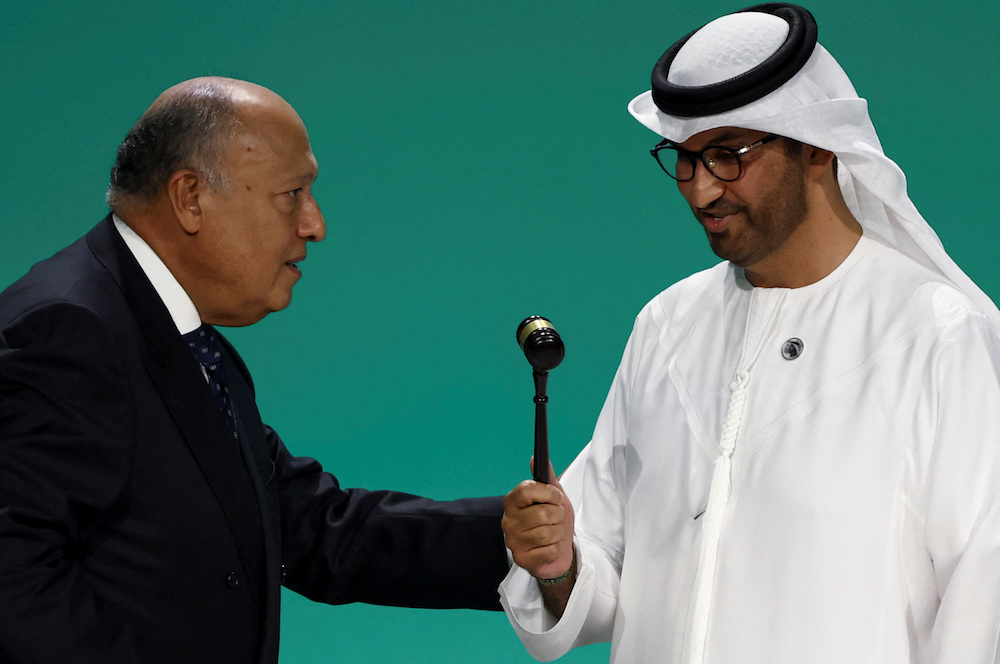
“This is the presidency that made a bold choice to proactively engage oil and gas companies. We had many hard discussions. That was not easy. But today, many of these companies are committing zero methane emissions by 2030 for the first time. And now, many national oil companies have adopted net zero 2050 targets for the first time,” Al-Jaber said in his speech.
“The next two weeks will not be easy. Let us remember, our task is not about only negotiating texts. It is about improving lives, it is about people,” he added.
1016 GMT
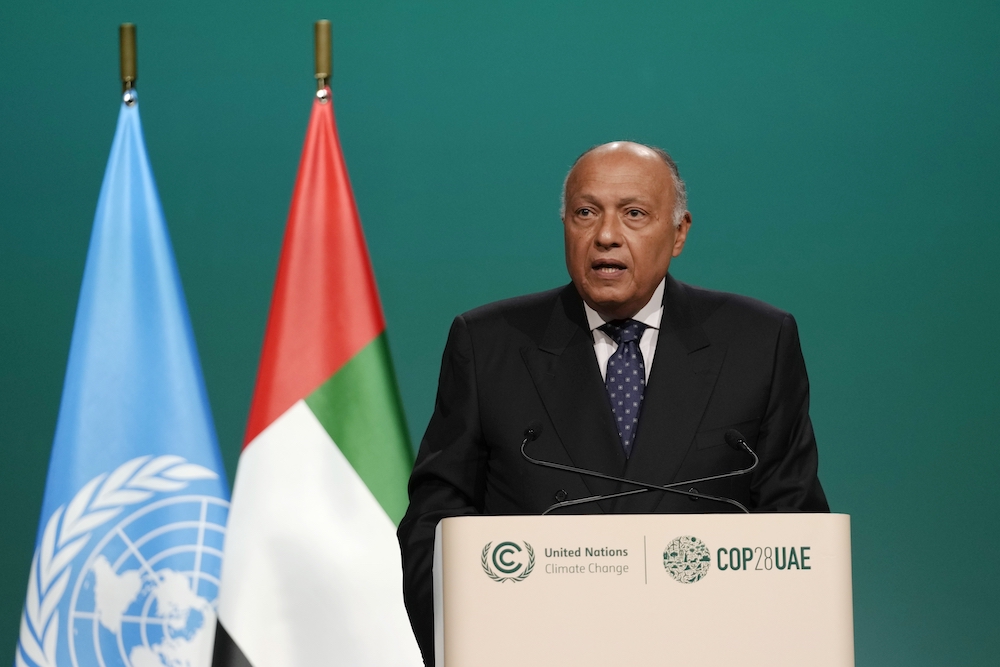
“Rather than increasing climate finance from developed countries, actually, it is decreasing in relation to growing needs and the increasing growth of financing in developing countries,” said Shoukry, the COP27 president.
The UN’s COP28 climate summit in Dubai opened Thursday with a moment of silence for the victims of the conflict in Gaza.
Sameh Shoukry, the Egyptian foreign minister who chaired the previous COP talks in Egypt last year, urged delegates to “stand for a moment of silence” in memory of two climate diplomats who recently died “as well as all civilians who have perished during the current conflict in Gaza”.
—–
An early breakthrough on the damage fund — which poorer nations have demanded for years — could help grease the wheels for other compromises to be made during the two-week summit.
The UN and hosts the UAE say the COP28 talks will be the most important since Paris in 2015, when nations agreed to limit global warming to well below 2°Celsius since the preindustrial era, and preferably to a safer limit of 1.5°C.
Scientists say the world is not on track to achieve these targets and nations must make faster and deeper cuts to emissions to avert the most disastrous impacts of climate change.
A central focus will be a stocktake of the world’s limited progress on curbing global warming, which requires an official response at these talks.
“Right now, we’re taking baby steps where we should be taking great leaps and great strides to get us to where we need to be,” said UN climate chief Simon Stiell on Wednesday.
The COP28 climate conference should aim for a complete “phaseout” of fossil fuels, UN Secretary-General Antonio Guterres earlier said, warning of “total disaster” on humanity’s current trajectory.
“Obviously I am strongly in favor of language that includes (a) phaseout, even with a reasonable time framework,” Guterres said.
Climate change is the biggest threat to human health in Africa and the rest of the world, the head of the continent’s public health agency said.
Mitigating that risk was top of his agenda, Jean Kaseya, the director general of the Africa Centres for Disease Control and Prevention, said as he headed to the COP28 climate summit in Dubai.
• with agencies



